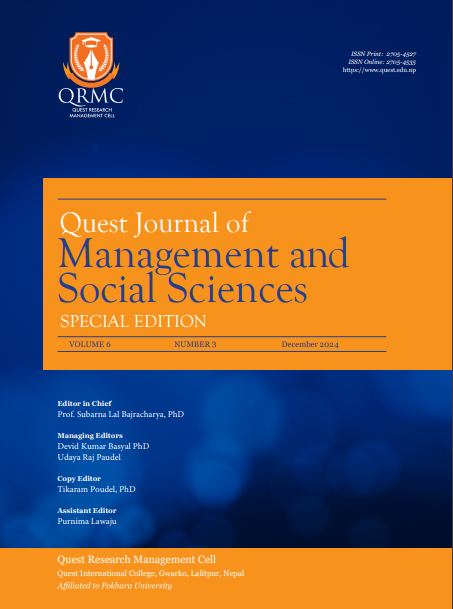Analysis of Determinants of Youth Migration Intentions in Nepal
DOI:
https://doi.org/10.3126/qjmss.v6i3.72205Keywords:
Cross-border mobility, Intergenerational tensions, Sustainable developmentAbstract
Purpose: This study examines the factors that impact Nepalese youth's tendency to migrate, explicitly focusing on economic conditions, educational achievements, the allure of foreign locations, and familial ties overseas.
Methods: This study used a descriptive and causal research design. The study gathered responses from 235 Nepalese youth using a convenience-based sampling technique and an organised survey questionnaire. It employed a linear regression analysis.
Findings: The study showed that economic conditions, educational achievement, and family networks abroad primarily influence migrational intentions. These factors exhibit strong positive correlations and possess high predictive capability. Although the attraction to abroad does play a role in migration, its effect is relatively minor. These findings show the importance of executing broad strategies that tackle economic possibilities, educational prospects, and social support systems to manage youth migration effectively.
Suggestions: Policymakers can carefully implement major determining factors to control outhandled migration rates. This research is helpful for policymakers trying to figure out how to deal with the issues and repercussions caused by migration.
Keywords: Cross-border mobility, Intergenerational tensions, Sustainable development
JEL Classification Codes: F22, J61, 015
Downloads
Downloads
Published
How to Cite
Issue
Section
License
Copyright (c) 2024 Quest Journal of Management and Social Sciences

This work is licensed under a Creative Commons Attribution-NonCommercial-NoDerivatives 4.0 International License.
This license enables reusers to copy and distribute the material in any medium or format in unadapted form only, for noncommercial purposes only, and only so long as attribution is given to the creator.




